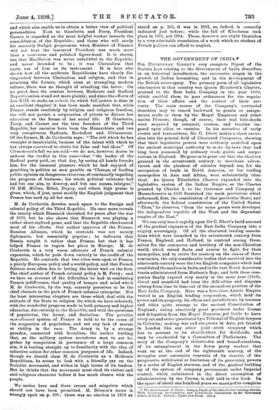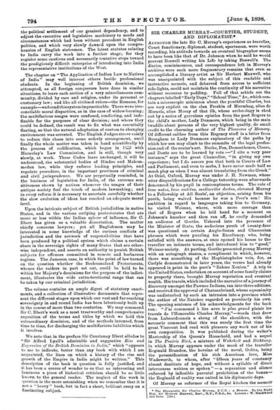THE GOVERNMENT OF INDIA.*
SIR COURTENAY 'LIMIT'S very complete Digest of the Statute Law relating to the Government of India describes, in an historical introduction, the successive stages in the growth of Indian lawmaking, and in the development of the British sovereignty. The primary germ of all legislative enactments in that country was Queen Elizabeth's Charter, granted to the East India Company in the year 1600, which enabled them to pass ordinances for the regula- tion of their affairs and the control of their ser- vants. The main source of the Company's territorial dominion may be traced backward to grants or assign- ments made to them by the Mogul Emperors and other native Princes ; though, of course, their real title-deeda were acquired by conquest, cession, and treaties im- posed upon allies or enemies. In his narrative of early events and transactions, Sir C. Ilbert makes a short excur- sion into the general field of Chartered Companies, showing that their legislative powers were evidently modelled upon the ancient municipal authority to make by-laws that had long been possessed by ordinary trade guilds and corpo- rations in England. He goes on to point out that the charters granted in the seventeenth century to merchant adven- turers and the planters of colonies beyond sea, for tht occupation of lands in North America, or for trading monopolies in Asia and Africa, were substantially iden- tical. As Queen Elizabeth's Charter expanded into the legislative system of the Indian Empire, so the Chartee granted by Charles L to the Governor and Company of Massachusetts in 1628 furnished the main provisions which influenced, first, the constitution of that particular State, and afterwards the federal constitution of the United States "Thus," he observes, "from the same germs were developeZ the independent republic of the West and the dependent empire of the East."
We can only touch rapidly upon Sir C. Dbert's lucid account of the gradual expansion of the East India Company into e mighty sovereignty. Of all the chartered trading associa- tions which were launched in the seventeenth century from France, England, and Holland, to contend among them- selves for the commerce and territory of the non-Christian world, which raised fleets and armies to fight for theis monopolies, and to strive for mastery on the coasts of three continents, the only considerable bodies that survived into the nineteenth century were the two English companies which had established themselves in India and in the vast North American tracts administered from Hudson's Bay; and both these com- panies finally expired very nearly in the same year (1858). Great and manifold had been the difficulties and disputes- arising from time to time out of the anomalous position of the East India Company. Here was a first-class Asiatic Empire vested in an English trading corporation, which . held its power and its property, its offices and jurisdictions, by tenures. and titles quite strange to the ancient Constitution of England ; ruling absolutely great provinces under license and delegation from the Mogul Emperor, yet liable to have every act and order questioned by a Tribunal of English lawyers in Calcutta ; making war and conquests in Asia, yet treated in London like any other joint - stock company which has to account to its shareholders for dividends, and may be overhauled by a Committee of Parliament. The story of the Company's vicissitudes and transformations, of its entanglement in the fierce party warfare that went on at the end of the eighteenth century, of the struggles over successive renewals of its charter, of the progressive withdrawal or limitation of its governing powers by a series of English statutes, and of the gradual building up of the system of company government under Imperial control, which culminated in the direct assumption of administration by the Crown, is well told in this book. Is the space of about one hundred years we managed to complete • The Government of India: being a Digest of the Statute Lan relating thereto. With thetorscal Introduction and Illustrative Documents by Sir Oeurtaiajr Ilbert, K.C.S.L Oxford Claretdou Press. 12110
the political settlement of our greatest dependency, and to adjust the executive and legislative machinery to needs and circumstances which had been without precedent in English politics, and which very slowly dawned upon the compre- hension of English statesmen. The latest statutes relating to India carry the work into a further stage; for they register some cautious and necessarily tentative steps toward the prodigiously difficult enterprise of introducing into India the representative institutions of the West.
The chapter on "The Application of Indian Law to Natives of India" may well interest others beside professional students. In the beginning of British dominion, we attempted, as all foreign conquerors have done in similar situations, to leave each section of a very miscellaneous com- munity, divided by race and religion, under its personal or customary law ; and like all civilised rulers—the Romans, for example—we found this eystem impracticable. There were irre- concilable moral disparities, as in the case of widow-burning ; the multifarious usages were confused, conflicting, and inde- finable for the purposes of clear decision; and where they could be defined, the result was to fix what was essentially floating, so that the natural adaptation of custom to changing environment was arrested. The English Judges strove vainly to reduce this chaos into some orderly arrangement, until nally the whole matter was taken in band scientifically by the process of codification, which began in i with Macaulay's Law Commission, and is still, though very slowly, at work. These Codes leave unchanged, it will be understood, the substantial bodies of Hindoo and Mahom- medan law, while they enforce leading principles, and regulate procedure, in the important provinces of criminal and civil jurisprudence. We are perpetually reminded, in the business of legislation for India, of the extreme sen- sitiveness shown by natives whenever the usages of their antique society feel the touch of modern lawmaking ; and in every reform it is necessary to ascertain carefully whether the slow evolution of ideas has reached an adequate moral level.
Upon the intricate subject of British jurisdiction in native States, and in the various outlying protectorates that are more or less within the Indian sphere of influence, Sir C. Ilbert has given us a valuable dissertation. The matter chiefly concerns lawyers ; yet all Englishmen may be interested in some knowledge of the curious conflicts of jurisdiction and the network of responsibilities that have been produced by a political system which claims a certain share in the sovereign rights of many States that are other- wise independent, and asserts an authority to punish British subjects for offences committed in remote and barbarous regions. The Jameson case, in which the point of law turned on the question whether the Bechuanaland Protectorate, whence the raiders in part set out, could be held to be within her Majesty's dominions for the purpose of the indict- ment, illustrates the wide extra-territorial range that can be taken by our criminal jurisdiction.
The volume contains an ample digest of statutory enact- ments, and a collection of illustrative documents that repre- sent the different stages upon which our vast and far-reaching sovereignty in and round India has been laboriously built up in the course of more than two centuries. We may commend Sir C. Ilbert's work as a most trustworthy and comprehensive exposition of the terms and titles by which we hold this extraordinary dominion, and of the methods invented, from time to time, for discharging the multifarious liabilities which it involves.
We note that in the preface Sir Courtenay Ilbert alludes to 4` Sir Alfred Lyall's admirable and suggestive Rise and Expansion of the British Dominion in India," which "appears to me to indicate, better than any book with which I am acquainted, the lines on which a history of the rise and growth of the Empire in India might be written." This description of the book in question is fully justified, and it has been a source of wonder to us that so interesting and luminous a piece of historical criticism should be so little known to the general reader. The neglect of the work in question is the more astonishing when we remember that it is not a " heavy " book, but in fact a short, brilliant essay on a fascinating subject.



































 Previous page
Previous page